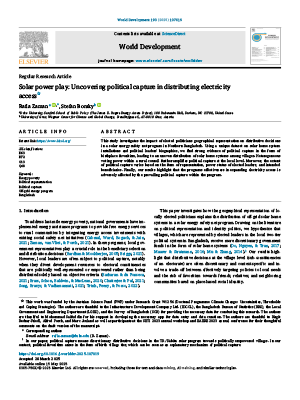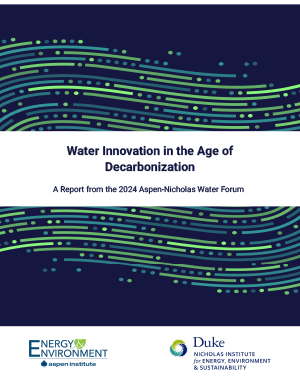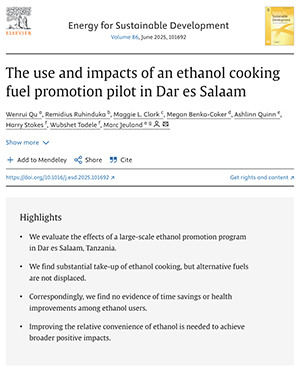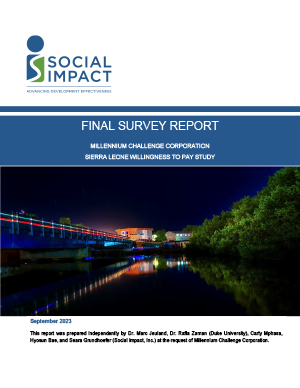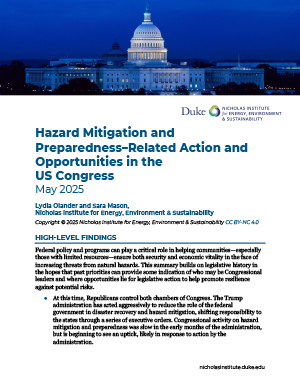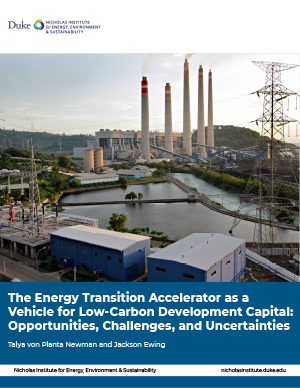Publications
Solar Power Play: Uncovering Political Capture in Distributing Electricity Access
This study investigates the impact of elected politicians geographical representation on distributive decisions in a solar energy safety net program in Northern Bangladesh. Using a unique dataset on solar home system installations and political leaders’ biographies, we find strong evidence of political capture in the form of birthplace favoritism, leading to an uneven distribution of solar home systems among villages. Heterogeneous voting power within a rural council further amplifies political capture at the local level.
Water Innovation in the Age of Decarbonization
The 2024 Aspen-Nicholas Water Forum focused on identifying innovative technologies, policy frameworks, business models, and institutional structures to enable decarbonization and adaptation within the water sector as well as the sector’s role in decarbonizing the broader economy. Forum participants explored key questions such as: How is innovation disrupting the water sector? How does water fit into broader decarbonization efforts?
Assessing the Financial Services Sector’s Leverage in Advancing a Sustainable Ocean Economy
Prior research suggests that the global financial services sector could influence the sustainability of the ocean economy, particularly with better information on companies’ externalities (Barbier 2023; Sumaila et al. 2021; Jouffray et al. 2019). This brief summarizes preliminary, non-peer-reviewed findings from ongoing research that explores the potential influence of the financial sector on the sustainability of the ocean economy. It aims to contribute to and inform policy discussions emerging from the United Nations Oceans Conference in June 2025.
Collection: Small-Scale Fisheries
Nature Portfolio has launched a new collection showcasing small-scale fisheries research conducted by the Illuminating Hidden Harvests (IHH) initiative.
The Use and Impacts of an Ethanol Cooking Fuel Promotion Pilot in Dar es Salaam
The authors evaluated the effects of a large-scale ethanol cooking fuel promotion program in Dar es Salaam, Tanzania, and found substantial uptake of ethanol cooking. However, alternative fuels were not fully replaced under this scheme. The report concludes that improving the relative convenience of ethanol as a cooking fuel is needed to achieve broader positive impacts.
Sierra Leone Compact—Willingness to Pay for Electricity: Final Survey Report
This study focuses on assessing willingness to pay (WtP) for electricity among households and businesses—both those already connected to the grid but coping with unreliable supply, and those who are expected to gain access through future grid expansion or densification. This work provides a comprehensive valuation of the benefits of both new electricity connections and enhanced reliability for current users, as well as a rich dataset on energy use, perceptions, and expenditures in the study area that could be used for policymaking or future research.
Hazard Mitigation and Preparedness–Related Action and Opportunities in the US Congress
Federal policy and programs can play a critical role in helping communities—especially those with limited resources—ensure both security and economic vitality in the face of increasing threats from natural hazards. This summary builds on legislative history in the hopes that past priorities can provide some indication of who may be Congressional leaders and where opportunities lie for legislative action to help promote resilience against potential risks.
Cooling Communities: Strategic Partnerships for Heat Resilience in the Carolinas
Extreme heat is an escalating public health and economic threat, particularly in rural, low-income communities across the Southeastern United States. In these areas, aging infrastructure, high energy burdens, and chronic health disparities intersect to create acute vulnerability during periods of excessive heat. Cooling Communities is a seed initiative that brings together community leadership, trusted faith-based institutions, and financial innovation to explore scalable, locally rooted strategies for heat resilience.
The Energy Transition Accelerator as a Vehicle for Low-Carbon Development Capital: Opportunities, Challenges, and Uncertainties
Addressing the dual needs of development and decarbonization in low- and middle-income countries requires significant increases in public and private investment and project implementation. Announced in 2022 by the US Department of State, The Rockefeller Foundation, and the Bezos Earth Fund, the Energy Transition Accelerator (ETA) aims to drive such increases by leveraging carbon credits as a sector-wide channel for energy transition finance.
Energy Transitions & Investment in Emerging Markets: Navigating Shifting Undercurrents
The Energy Transitions and Investment in Emerging Markets: Navigating Shifting Undercurrents summit was convened on April 8, 2025, during a moment of profound disruption and transformation. In an era marked by the dismantling of US foreign assistance programs and rising pressures on multilateral systems, the event brought together the Duke University community and leading practitioners to take stock and ask urgent questions about what comes next.

